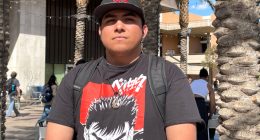
A national Latino legal and civil rights organization has been going after financial institutions for allegedly implementing policies that discriminate against eligible DACA recipients by denying them loans and other services based on their immigration status, according to 10 lawsuits filed over the past seven years.
The Mexican American Legal Defense and Educational Fund, better known as MALDEF, filed its two most recent lawsuits last week.
“It’s a big problem,” Thomas Saenz, president and general counsel at MALDEF, said in an interview with NBC News on Thursday. In addition to the lawsuits they have already filed, MALDEF is investigating “at least half a dozen more” similar cases. “Every time we file one of these cases, we get contacted by people saying, ‘Hey, this happened to me at another bank or credit union.'”
Nearly 580,000 undocumented young adults, many of them Latino, who came to the U.S. as children can work and study without fear of deportation under the Deferred Action for Childhood Arrivals program, or DACA. With the employment authorization card and social security number they receive under the Obama-era program, DACA recipients can apply for certain types of loans to buy a house or a car as well as access other kinds of financial services. Their DACA status must be renewed every two years.
On Wednesday, MALDEF sued Noble Credit Union on behalf of a 28-year-old DACA recipient from California who was denied a car loan based on the credit union’s “limited and arbitrary immigration-status requirements,” according to the lawsuit first obtained by NBC News on Thursday.
Noemi Peraza Lopez applied for a $35,000 auto loan this past summer and got approval from Noble, according to the complaint, which was still being processed, pending acceptance by the court Thursday.
Noble then denied the loan after seeing that Peraza Lopez’s driver’s license states it’s for “limited-term,” meaning its renewal aligns with the DACA recipient’s renewal status every two years.
Following the incident, Peraza Lopez applied for another loan at a different bank and received it. But the terms were less favorable than the one Noble initially approved and denied, causing Peraza Lopez “to feel the deleterious effects of discrimination,” according to the lawsuit.
NBC News called Noble Credit Union to request comment Thursday afternoon.
MALDEF filed another lawsuit last Friday against an Oregon-based credit union for “unlawfully denying a home equity loan to a DACA recipient based on his immigration status,” the organization said.
The plaintiff on the case, Ismael Rodriguez Perez, applied for a home equity loan at a First Tech Federal Credit Union location in California this past summer. The 31-year-old DACA recipient was initially told he was approved for the loan, according to the lawsuit. But the credit union conditioned the approval on Rodriguez Perez having a green card, which only permanent residents have, not DACA recipients.
Rodriguez Perez was later denied the loan after a First Tech representative told him his employment authorization card — which he had previously used to purchase a home in Washington state, obtain employment and open various bank and retirement accounts — would be insufficient on its own to get the loan, the lawsuit alleges.
“I applied for a loan convinced that as a taxpayer and property owner, I qualified. I was denied a loan based on my immigration status and despite the equity of my home and my credit worthiness. Such discrimination is simply wrong,” Rodriguez Perez, a battery materials scientist, said in a statement.
Since DACA started in 2012, this section of the population has contributed $108 billion to the U.S. economy, as well as $33 billion in combined taxes, according to the immigration advocacy group FWD.us.
“I’ve been a DACA recipient for more than a decade and am constantly reminded that I am not fully accepted in this remarkable nation,” Rodriguez Perez added.
First Tech Federal Credit Union told NBC News in a statement Wednesday evening that it “does not engage in unlawful discrimination against loan applicants.”
“While we are now aware of the lawsuit, the credit union has not yet been served with the complaint or otherwise notified,” the statement reads. “As a result, we have just started the investigation of the claims and are not in position to evaluate the allegations contained in the article or provide further comment on this pending litigation.”
2017 marked the first time MALDEF legally challenged a financial institution for discriminating against DACA recipients based on their immigration status.
That year, MALDEF sued Wells Fargo, arguing that the bank’s policies making DACA recipients ineligible for unsecured consumer credit cards and loans violated federal and state civil rights laws. Wells Fargo eventually settled the class-action suit in 2020 and was required to pay more than $18.7 million to affected DACA recipients and change its lending policies.
‘A lack of awareness’
Last year, settlements were reached in three other similar cases involving a bank headquartered in Utah and two credit unions, one based in Chicago and another in California. Saenz said the case involving the bank “is over and money has been distributed” to members of the class-action lawsuit. The credit union cases are in different stages of the settlement approval process.
Last week, “a confidential resolution” was reached in another lawsuit filed by MALDEF of behalf of a DACA recipient from Tampa, Florida. According to the lawsuit filed in October 2022, Nanci Palacios Godinez was denied a credit card at GTE Federal Credit Union because she wasn’t a permanent resident. GTE has denied all allegations brought in the lawsuit.
Two other cases remain in “active negotiations,” Saenz said.
“The reason these cases tend to settle is that, oftentimes, it seems to be longstanding policies that have never been questioned,” Saenz said. “When you have that context of quick settlements, it means there’s just a lack of awareness at the high levels of these institutions about what their longstanding policies do.”
As these cases emerged, the Consumer Financial Protection Bureau and the Department of Justice released a joint statement warning creditors and borrowers about how over-relying on immigration status in the credit-decision process “may run afoul of Equal Credit Opportunity Act’s anti-discrimination provisions and could also violate other laws.”
Part of the reason MALDEF continues to try these cases is to “get a definitive ruling” from the Supreme Court, since federal laws are not very clear when it comes to issues of discrimination based on immigration status or against subgroups of immigrants, Saenz said.
“If we can’t get a definitive ruling, then it would be best to get the Congress to be clearer,” he said. “A clear congressional statement that discrimination against subgroups of immigrants is unlawful … would prevent potential discrimination against a large class of conditional residents who are in the process of legalization,” not just DACA recipients.
Source: | This article originally belongs to Nbcnews.com










